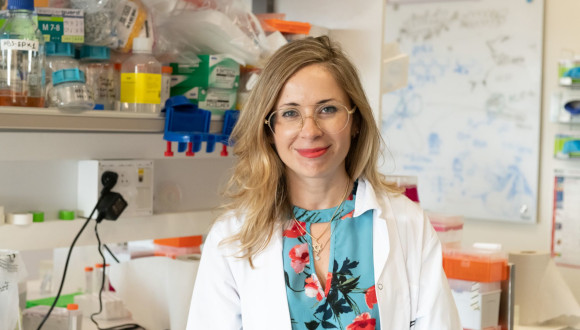Tel Aviv University researchers develop coronavirus antibody cocktail from blood of COVID-19 patients

Antibody cocktail to serve as both medication for patients and preventive treatment for high-risk populations
Support this researchTel Aviv University researchers have isolated and characterized six antibodies derived from the blood of two severely ill coronavirus patients, then demonstrated that combinations of three antibodies at a time act as an effective cocktail against COVID-19. The cocktail provided natural immunity against the disease that possibly extends for several months.
The researchers found that the blood’s capacity for neutralizing the virus comes from several types of antibodies that simultaneously attack different areas on the virus, and that the cocktail is very effective in neutralizing the COVID-19 virus. The study was carried out in cell cultures, and clinical trials, the next step in the process, may take several months.
The study was conducted in Dr. Natalia Freund‘s Laboratory of Human Antibody Research by Dr. Freund and her PhD student Michael Mor at TAU’s Sackler Faculty of Medicine. Early results were published at bioRxiv on October 6 and are currently under review for publication in the journal PLOS Pathogens.
The research began in April 2020, soon after the pandemic reached Israel. Dr. Freund and her group recruited 18 of Israel’s earliest COVID-19 patients, 10 with mild or no symptoms and 8 severely ill patients who were hospitalized at the Ichilov and Kaplan Medical Centers. All participants recovered from the disease.
“We wanted to understand the antibody response following infection with COVID-19,” explains Dr. Freund. “One question we asked was whether there was any difference between mild and severe cases about both the quality and quantity of the anti-viral antibodies produced by the immune system.”
Dr. Freund and her team conducted genetic sequencing of thousands of antibodies derived from the participants’ blood, then cloned them in the lab and tested their effectiveness in neutralizing the virus. They found a significant statistical difference between the two groups of patients in the ability of their antibodies to neutralize COVID-19: Only a small portion of the mildly ill participants developed neutralizing antibodies, and some developed no antibodies whatsoever.
According to Dr. Freund, “We can assume that people who were infected but remained asymptomatic or developed very mild symptoms may possibly contract the disease a second time. The blood of all severely ill patients, on the other hand, contained neutralizing antibodies that will probably protect them from reinfection. However, it is not yet clear how long these antibodies remain in the blood and provide long-term protection.”
In the second stage of the project, Dr. Freund and her team tried to isolate specific antibodies from the thousands that had been sequenced that prevent the virus from binding to the human cell and replicating itself inside the cell. The researchers were able to identify six different antibodies, obtained from two severely ill participants, and prove that these antibodies are effective in both treating and preventing infection in cell cultures.
“These are six antibodies bind different target areas on the virus,” says Dr. Freund. “It’s not a single mechanism, but rather several complimentary mechanisms of action. The antibodies identify various weak spots on the virus, bind these spots, and neutralize the virus.
“We tested the antibody cocktail on the live virus in a cell culture and saw that the antibodies bind the virus in a way that blocks it and prevents it from penetrating the cells. We hope that our cocktail will be used to treat COVID-19 patients like the experimental cocktail administered to President Trump, or as a preventive measure for high-risk populations and medical personnel until the much-awaited vaccine finally arrives.
“It must be understood that we did not develop this cocktail,” Dr. Freund continues. “It was developed naturally by the patients’ immune systems, which means that it is probably safe for use. Since these antibodies are stable in the blood, a preventive injection can provide protection for several weeks, and possibly even several months. The next stage in this research project will be testing the cocktail on humans.”
Ramot, the technology transfer arm of Tel Aviv University, has submitted patent requests for all antibodies discovered in the study.
The results are available at bioRxiv‘s web site here.